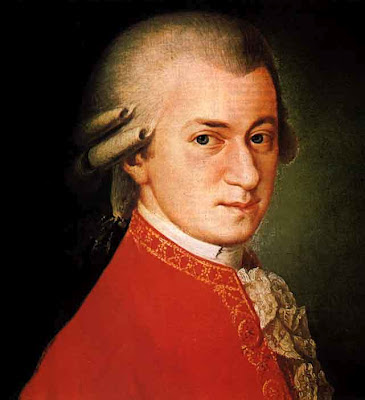It's all about the classical music composers and their works from the last 400 years and much more about music. Hier erfahren Sie alles über die klassischen Komponisten und ihre Meisterwerke der letzten vierhundert Jahre und vieles mehr über Klassische Musik.
Total Pageviews
Monday, December 17, 2012
Sunday, December 9, 2012
Friday, November 30, 2012
Sunday, November 18, 2012
Nikolai Rimski-Korssakoff - His Music and Life
Sunday, November 4, 2012
Serge Prokofieff - His Music and Life
Friday, November 2, 2012
Tuesday, October 30, 2012
Tuesday, October 23, 2012
Franz Liszt - His Music and Life
Monday, October 22, 2012
Friday, October 19, 2012
Giovanni Battista Pergolesi - His Music and Life
Born on January 4, 1710 in Ancona/Italy, Giovanni Battista Pergolesi passed away in Pozzuoli/Italy on March 16, 1736.
Tuesday, October 16, 2012
Giacomo Meyerbeer - His Music and Life
. He tried to survive as a pianist. Fox six years, he wasn't able to compose ven a single piece. Only after moving to Paris and adopting the French opera-style, Meyerbeer held the field. His operas consisted of emotive and sometimes histrionic terms together with big choirs and acts: "Robert, the devil" (1831), "The Hugenots" (1836), "The Prophet" (1849) and "The African" (1838). Meyerbeer seems to be forgotten up tp now because many attempts to restore his compistions have been without success. it's really a great pitey. But, you can enjoy his music in one of my radioshows...
Wednesday, October 10, 2012
Franz Lehar - His Music and Life
Friday, October 5, 2012
Johannes Brahms - His Music and Life
Brahms became a contra-bass-player and respected horn player. As a young boy Brahms earned his livings by performing in different sailor saloons and dives.
After wretched and puny school years he did try to build up a higher education through self-confidence and self-study. Brahms surprisingly drew people's attention to his impressing piano playing, especially when he accompanied the Hungarian violinist Eduard Remeny on virtuoso touring.
In 1858, Brahms became Musical Director in Detmold/Germany. In 1863, Brahms has been in charge of the Vienna Academy of Music. As freelance artist Brahms lived a carefree life. Schubert had been forced to it, Beethoven succeeded in doing at the beginning.
The Piano was Brahms' source of composing work. He could fulfill a sonata's gigantic measurements and extents. Richard Wagner and Johannes Brahms have been the "Children of Romanticism", but only Brahms has lacked the pathos of theatrical language and expressionism. But, Brahms' compositions have become a world power - equal to Beethoven and Wagner.
This space doesn't allow mentioning the whole life's work of an incredible German classical composer named Johannes Brahms.
More in my next post about him.
(To be continued!)
Tuesday, October 2, 2012
Maurice Ravel - His Music and Life
“The only love affair I have ever had was with music.”
Maurice Ravel
The history of classical music, however, is full of fabulously gifted individuals with slightly more earthy ambitions. Love stories of classical composers are frequently retold within a romanticized narrative of sugarcoated fairy tales. To be sure, happily-ever-after stories do on rare occasions take place, but it is much more likely that classical romances lead to some rather unhappy endings. Johannes Brahms had an overriding fear of commitment, Claude Debussy drove his wife into an attempt at suicide, Francis Poulenc severely struggled with his sexual identity, and Percy Grainger was heavily into whips and bondage. And that’s only the beginning! The love life of classical composers will sometimes make you weep, or alternately shout out with joy or anguish. You might even cringe with embarrassment as we try to go beyond the usual headlines and niceties to discover the psychological makeup and the societal and cultural pressures driving these relationships. Classical composer’s love stories are not for the faint hearted; they are heightened reflections of humanity at its best and worst. Accompanying these stories of love and lust with the compositions they inspired, we are able to see composers and their relationships in a completely new light.
Friday, September 28, 2012
Thursday, September 27, 2012
Tuesday, September 25, 2012
Jean Sibelius - His Music and Life
Saturday, September 22, 2012
Tuesday, September 4, 2012
Niccolo Paganini - His Life and Music
Monday, August 27, 2012
Edvard Grieg - His Life and Music
Saturday, August 25, 2012
Anton Vivaldi - His Life and His Music
Monday, August 20, 2012
Johann Strauss - His Life and Music
Monday, August 13, 2012
Thursday, August 9, 2012
Bela Bartok
Tuesday, July 31, 2012
Wolfgang Amadeus Mozart - His Music and His Life
Mozart belongs to the great Vienna Classics with out doubts. A whole human life would never be enough to explain what Mozart achieved within his short life of 35 years only. More than 600 music works have been noted. Some of them are:
The children opera "Bastian and Bastienne" (17680, "Haffner Serenade and Symphony' (1782), the operas "Figaro's Marriage" (1786), "Don Giovanni" (1787), "Cosi Fan Tutte" (1790) as well as "The Magic Flute" (1791) or "Eine kleine Nachtmusik" (A little Nightmusic).
Thursday, July 26, 2012
Friedrich Smetana -His Music and His Life
Tuesday, July 24, 2012
Jacques Offenbach - his music and his life
Saturday, July 21, 2012
Heinrich Marschner
He studied law in Leipzig and Vienna - then music. In Vienna he met Ludwig van Beethoven. Being a privat music instructor in Pressburg, he composed his first operas.
1822, Marschner moved to Dresden and became orchestra-master. Two operas made him famous: "Der Vampyr" (1828) and "Der Templer und die Juedin" (1829) - following Scott's "Ivanhoe".
1831, Marschner became Royal Orchestra Master in Hanover. His master piece "Hans Heiling" has been publised in 1833.
Marschner's operas are deeply romantic with nightly horror-elements and demonic gestures, while his chamber music compositions didn't carry through.










.jpg)













 y
y